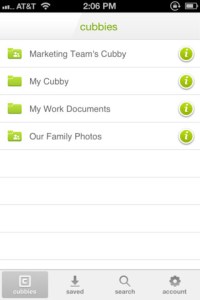Cubby, the new cloud storage player from LogMeIn which aggressively, if belatedly, entered the market this year to compete alongside Dropbox, Google Drive, Box, SkyDrive and others, is today revealing its pricing and Pro plans. The service first debuted in April, previously offering users up to 5 GB of online storage for free, with an additional 1 GB for each referral – double that of Dropbox.
 The service was entirely free to use during its beta period. Today, the company is introducing its pricing structure for the first time, but the service will remain in beta mode until early 2013. Currently, the free version of the service, now called “Cubby Basic,” will continue to offer users most of what they had access to during the free beta period – that is, 5 GB of free cloud storage, and access to their files from PC, Mac, mobile or tablet by way of Cubby client software.
The service was entirely free to use during its beta period. Today, the company is introducing its pricing structure for the first time, but the service will remain in beta mode until early 2013. Currently, the free version of the service, now called “Cubby Basic,” will continue to offer users most of what they had access to during the free beta period – that is, 5 GB of free cloud storage, and access to their files from PC, Mac, mobile or tablet by way of Cubby client software.
The paid option, “Cubby Pro,” meanwhile, will start at $6.99/month ($83.88/year) for 100 GB of cloud storage. To lock in that rate, subscriptions have to be prepaid annually. Month-to-month pricing will be $9.99/month. However, early adopters who sign up before the service exits beta sometime next year can get a better rate – 100 GB for $3.99/month (or $47.88/year billed annually).
Both tiers, free and paid, offer online storage, public and private sharing, unlimited versioning and file size uploads, client-side file encryption (AES 256-bit), and access to files from Mac, Windows, Android or iOS. Pro users will additionally have access to one of Cubby’s better features, DirectSync, in addition to increased support and user-held encryption keys dubbed “Cubby Locks.” These Locks let you set passwords on files which have to be entered in order to use and share the files. For sensitive documents, this could help protect files on devices that could more easily become lost or stolen – like phones, laptops or tablets, for instance.
The other Pro feature mentioned above, DirectSync, allows users to sync an unlimited amount of data across their devices, without counting towards their cloud storage limits. It’s somewhat reminiscent of Microsoft’s now-shuttered Live Mesh service (yes, it still existed!), in the sense that it too offers hard limits as to how many files can be stored online, while more data can simply be synced between computers. That feature puts Cubby more in direct competition these days with SugarSync, now that Mesh is no more.
In terms of the bottom line, special beta pricing aside, Cubby remains competitive now that’s it’s a paid service. For comparison’s sake:
- SugarSync is $4.99/month or $49.99/year for 30 GB and goes up from there. Its 100 GB plan is $14.99/month or $149.99/year.
- Google Drive gives you 5 GB for synced and uploaded files for free, and doesn’t count those created or converted to Google Docs format. You can buy more storage here. It also offers 25 GB for $2.49/month, 100 GB for $4.99/month and then goes up to 200 GB for $9.99/month or 400 GB for $19.99/month. (Storage is shared between Google Drive and Google+ Photos.)
- Box (Personal) account holders can host between 5 and 50 GB of files with 5 GB available for free. 25 GB is $9.99/month and 50 GB for $19.99/month.
- Dropbox starts with 2 GB for free but users can climb to 18 GB by maximizing referrals. Paid upgrade plans start at $9.99/month for 100 GB.
- SkyDrive offers 7 GB for free, then you can add an additional 20 GB for $10/year, 50 GB for $25/year, and 100 GB for $50/year.
Of course, bottom-line pricing is not users’ only concern here. Many are drawn to Dropbox because they can game the system’s referral process to increase their free storage. Others are more tied into an ecosystem (as with Google), so they want to increase their storage there instead. The overall feature set and user experience of each service is also important when making a final decision, and this includes how well the apps look and behave on the devices you use the most. Some of this comes down to personal preference, too.
None of this is a necessarily a zero-sum game, however. For example, I pay for extra Google storage, but also use Dropbox.
Cubby’s pricing and early beta discounts are live now here on the homepage.
